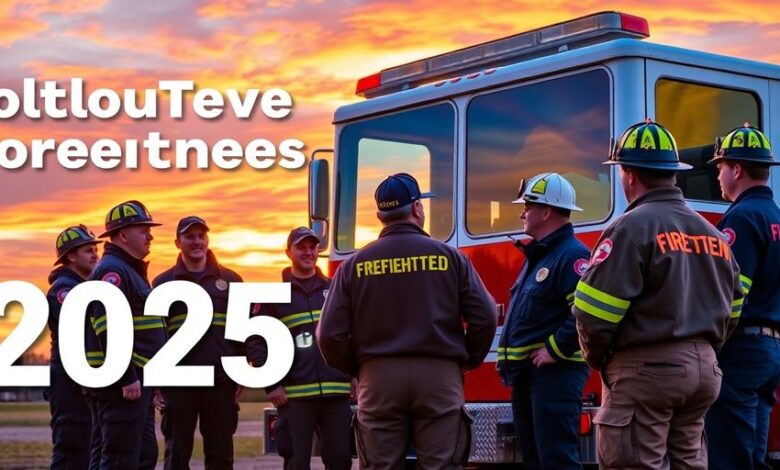
In 2025, the question of whether volunteer firefighters get paid remains a hot topic. While many people think of firefighters as professionals earning a salary, the reality is that most firefighters in the U.S. are volunteers. These brave individuals dedicate their time and effort to protect their communities, often juggling their firefighting duties with other jobs. Understanding how volunteer firefighters get compensated is essential for both those considering this role and the communities that rely on their services. Let’s explore the various compensation structures and benefits available to volunteer firefighters today.
Key Takeaways
- Most volunteer firefighters do not earn a regular salary, but some may receive stipends or per-call payments.
- Compensation varies significantly by region, with some departments offering more support than others.
- Volunteer firefighters often enjoy tax benefits and may have access to tuition reimbursement programs.
- Balancing firefighting duties with full-time jobs is common, requiring strong time management skills.
- Community support, through fundraising and local government initiatives, is crucial for sustaining volunteer fire departments.
The Role Of Volunteer Firefighters
Understanding Volunteer Firefighting
Volunteer firefighters are the backbone of many communities, especially in rural areas. They provide essential fire protection and emergency services, often with limited resources. It’s easy to think of them as just showing up to put out fires, but their role is much broader. They respond to a variety of calls, including medical emergencies, car accidents, and other disasters. The dedication of these individuals is truly remarkable, considering they balance their volunteer duties with regular jobs and family responsibilities.
Community Impact of Volunteer Firefighters
The impact of volunteer firefighters extends far beyond just responding to emergencies. They are deeply involved in their communities, participating in public education programs, conducting fire prevention inspections, and engaging in various outreach activities. Without volunteer fire departments, many smaller communities would struggle to afford adequate fire protection. The presence of a local fire department can also boost community morale and create a sense of security. It’s not just about fighting fires; it’s about building a stronger, safer community. Many citizens don’t even realize that it’s a Volunteer Fire Department.
Challenges Faced by Volunteer Firefighters
Despite their vital role, volunteer firefighters face numerous challenges. Recruitment and retention are ongoing concerns, as the time commitment and physical demands can be difficult for many to manage. Funding is another major hurdle, as volunteer departments often rely on donations and fundraising to cover operating expenses. Training requirements are also becoming more rigorous, requiring volunteers to dedicate significant time to maintain their certifications. Balancing these challenges with their personal lives requires immense dedication and support from their families and employers.
Volunteer firefighters are expected to perform physically demanding tasks, sometimes in inclement weather conditions. This can involve extinguishing fires, performing salvage operations, rendering first aid, and cleaning and inspecting equipment after calls.
Here’s a quick look at some common responsibilities:
- Fire suppression
- Emergency medical services
- Hazardous materials response
Compensation Structures For Volunteer Firefighters

Types of Compensation Available
While the term “volunteer” suggests unpaid work, the reality is more complex. Volunteer firefighters often receive some form of compensation to acknowledge their dedication and help with expenses. It’s important to understand that the Fair Labor Standards Act (FLSA) has rules about how volunteer firefighters can be paid, to ensure they are classified as volunteers and not employees. This means they generally can’t receive an hourly wage or salary.
Stipends and Per-Call Payments
One common way volunteer firefighters are compensated is through stipends or per-call payments. Stipends are fixed amounts paid periodically (monthly or annually), while per-call payments are given for each incident a firefighter responds to. The amount can vary greatly depending on the department, location, and the firefighter’s role. Some departments also reimburse volunteers for gas money and other expenses incurred while on duty. Per-call rates can be quite low, sometimes just a few dollars, intended to cover basic costs rather than serve as actual payment.
Legal Considerations in Compensation
It’s important for fire departments to structure their compensation systems carefully to comply with labor laws. Misclassifying volunteers as employees can lead to legal issues. Here are some key considerations:
- FLSA Compliance: Ensure that any payments made do not violate the FLSA’s regulations regarding volunteer status.
- State and Local Laws: Be aware of specific state and local laws that may govern compensation for volunteer firefighters.
- Insurance Coverage: Verify that volunteers are adequately covered by insurance in case of injury or liability while on duty.
Understanding the legal framework surrounding compensation is vital for both the fire departments and the firefighters themselves. It helps ensure fair treatment and protects everyone involved.
Financial Benefits Beyond Pay
Tax Incentives for Volunteer Firefighters
Volunteer firefighters often get more than just a small payment for their service. Many states offer tax incentives to recognize their contributions. These incentives can provide real financial relief. For example, some states offer a tax credit to active volunteer firefighters who meet certain training and service requirements. It’s a way of saying thanks and helping them out financially.
Tuition Reimbursement Programs
Another cool benefit is tuition reimbursement. Some fire departments or local governments offer programs where volunteer firefighters can get help paying for college or other educational courses. This is a huge deal for those looking to further their education without racking up a ton of debt. It’s an investment in their future, and it also helps the fire department by encouraging continued education and training.
Retirement Benefits and Pension Plans
Many fire departments provide pension and retirement benefits to volunteer firefighters as an incentive for long-term service. These programs, often referred to as Length of Service Award Programs (LOSAPs), fall under Internal Revenue Code 457 and must meet specific criteria:
- Participants must be bona fide volunteers
- Annual contributions for any individual cannot exceed USD 3,000.00
- LOSAPs can be structured as either Defined Benefit (DB) or Defined Contribution (DC) plans:
It’s not just about the here and now. Thinking about the future is important, and these retirement plans can make a big difference down the road. It’s a way to reward dedication and ensure that volunteers have something to look forward to after years of service. Plus, it helps retain experienced firefighters, which is a win-win for everyone.
Balancing Volunteer Work With Employment
It’s a juggling act, no doubt about it. Being a volunteer firefighter is a serious commitment, and it can be tough to manage alongside a regular job. But people do it every day. It takes dedication, good time management, and a supportive employer.
Managing Time Commitments
Volunteer firefighters need to be masters of their schedules. Time management is key. You’ve got training sessions, meetings, and, of course, emergency calls that can come at any time. Many departments have minimum attendance requirements for training and responses, so you need to be organized. It’s not always easy, but it’s doable with planning and communication.
- Communicate with your employer about your volunteer commitments. Transparency is important.
- Use a calendar or planner to schedule all your activities, including work, volunteering, and personal time.
- Prioritize tasks and learn to say no to commitments that will overextend you.
Part-Time Job Opportunities
Some volunteer firefighters look for part-time jobs that offer more flexibility. This could mean working evenings or weekends, or finding a job that allows for on-call availability. It’s all about finding something that complements the demands of firefighting. Some even find opportunities within the fire service itself, like administrative roles or firefighting education.
Support from Employers
Having an employer who understands and supports your volunteer work can make a huge difference. Some companies even offer benefits to employees who are volunteer firefighters, such as paid time off for training or emergency calls. It’s worth checking with your employer to see if they have any policies in place to support volunteerism.
It’s important to remember that being a volunteer firefighter is a valuable service to the community. Employers who support their employees’ volunteer efforts are not only helping their employees, but also contributing to the well-being of the community as a whole.
Community Support for Volunteer Firefighters
Fundraising Initiatives
Volunteer fire departments often rely on the generosity of their communities to stay afloat. Fundraising is a constant effort, and it takes many forms. Think about those pancake breakfasts, car washes, and bake sales – they’re not just fun events; they’re vital for raising money to buy new equipment, maintain existing gear, and fund training programs. Departments are getting creative, too, with online campaigns and partnerships with local businesses becoming more common. It’s all about getting the community involved and showing them how their contributions directly support the people who protect them.
Local Government Support
Local governments play a big role in supporting volunteer fire departments. This support can come in different forms, like direct funding, grants, and access to resources. The level of support can vary a lot depending on the size and financial situation of the community. Some towns might provide a fire station and equipment, while others offer stipends or tax breaks to volunteers. It’s a partnership, really, with the local government recognizing the importance of having a well-equipped and trained fire department, even if it’s staffed by volunteers. It’s also about making sure the department meets certain standards and regulations, which helps ensure the safety of both the firefighters and the community they serve.
Community Awareness Programs
It’s easy to take volunteer firefighters for granted, but community awareness programs help remind people of the important role they play. These programs can include fire safety demonstrations at schools, open houses at the fire station, and public service announcements about fire prevention. The goal is to educate the public about fire safety and to show appreciation for the volunteers who dedicate their time and effort to protecting the community. Plus, these programs can help with recruitment, as people learn more about what it means to be a volunteer firefighter and the benefits of service.
Raising awareness is key. When people understand the challenges and sacrifices made by volunteer firefighters, they’re more likely to support them through donations, volunteering, or simply spreading the word about the department’s needs.
Here are some common activities:
- Fire safety education in schools
- CPR and first aid training for residents
- Community events like parades and festivals
Motivations Behind Volunteering
Desire to Serve the Community
For many, the primary motivation to become a volunteer firefighter stems from a deep-seated desire to give back to their community. It’s about protecting neighbors, friends, and family during times of crisis. This sense of civic duty is a powerful driver, pushing individuals to dedicate their time and energy to rigorous training and demanding emergency responses. It’s not just about fighting fires; it’s about being a pillar of support during someone’s worst day. People want to make a tangible difference, and firefighting offers a direct way to do that. They see a need and step up to fill it, embodying the spirit of community service.
Personal Fulfillment and Growth
Volunteering as a firefighter isn’t just about helping others; it’s also a journey of personal growth. The challenges faced, the skills acquired, and the camaraderie built all contribute to a sense of fulfillment that’s hard to find elsewhere. Selflessness is a big part of it, but so is the feeling of accomplishment that comes from mastering new skills and overcoming difficult situations. It’s a chance to push personal boundaries, build confidence, and discover hidden strengths. The sense of purpose derived from such demanding service is a significant motivator for many volunteers.
Building Lifelong Skills
Becoming a volunteer firefighter provides an opportunity to develop a wide range of skills that are valuable both in and out of the firehouse. These skills include:
- Emergency medical training
- Leadership and teamwork abilities
- Problem-solving under pressure
- Effective communication
The training and experience gained as a volunteer firefighter can translate into career advancement, improved decision-making, and enhanced leadership qualities. These skills are highly sought after by employers and can provide a competitive edge in various professional fields. The volunteer programs offer a unique blend of practical knowledge and personal development, making it an attractive option for those looking to expand their skill set.
Variability in Compensation Across Regions

It’s interesting how much the financial side of being a volunteer firefighter can change depending on where you are. It’s not a one-size-fits-all situation, and several things play a role in what you might get in terms of compensation or benefits.
Regional Differences in Payment
What a volunteer firefighter gets paid (or not paid) really depends on the region. In some areas, especially those with smaller budgets, volunteers might only get a small stipend to cover basic expenses, like gas. Other regions might offer more substantial per-call payments or better benefits packages. The cost of living in an area often influences these compensation levels.
Factors Influencing Compensation Rates
Several factors affect how volunteer firefighters are compensated:
- Local Budget: The available funds in the local government’s budget play a big role. If the town is struggling financially, there might not be much money to go around for volunteer firefighter compensation.
- Call Volume: Areas with higher call volumes might offer better compensation to attract and retain volunteers. More calls mean more time commitment, which should be recognized.
- Risk Level: The types of emergencies that firefighters respond to can also affect compensation. Higher-risk environments might warrant better pay or benefits.
It’s important to remember that the term “volunteer” implies service without pay, but the reality is more complex. Many volunteer firefighters receive some form of compensation to help offset costs and recognize their dedication.
Case Studies of Different Departments
Let’s look at a couple of examples to illustrate the differences:
- Rural Iowa: Volunteer firefighters might receive a small tax credit and minimal per-call payments, mainly to cover gas. The focus is on the volunteer aspect, with incentives to encourage participation.
- Suburban New Jersey: Departments might offer more substantial stipends, better retirement plans, and tuition reimbursement programs. This is to attract and keep volunteers in areas where the time commitment can be significant.
It all comes down to the specific needs and resources of the community. Some places rely heavily on volunteers due to budget constraints, while others can afford to offer more attractive compensation packages.
Wrapping It Up
So, there you have it. Volunteer firefighters are a vital part of our communities, and while they don’t get paid like full-time firefighters, they do have some options for compensation. Whether it’s a small stipend or a bit of cash for each call, it helps them cover some costs. But let’s be real, most of them do it for the love of the job and the chance to help others. It’s a tough balance between their firefighting duties and their day jobs, but many manage to juggle both. If you’re thinking about becoming a volunteer firefighter, just know it’s not all about the money. It’s about making a difference and being part of something bigger.
Frequently Asked Questions
Do volunteer firefighters receive any payment?
Volunteer firefighters usually don’t get a regular salary like full-time firefighters. However, some may receive small payments for each call or a stipend to help with expenses.
Why do people choose to be volunteer firefighters?
Many people become volunteer firefighters because they want to help their community. They find it rewarding and enjoy being part of a team.
How much do volunteer firefighters get paid per call?
The amount volunteer firefighters get paid per call varies by location and department rules. Some might earn a few dollars, mainly to cover costs like gas.
Are there any benefits for volunteer firefighters?
Yes, volunteer firefighters can receive benefits like tax breaks, tuition help for courses, and sometimes retirement plans after serving for a number of years.
What skills do volunteer firefighters learn?
Volunteer firefighters gain many skills, including teamwork, leadership, and emergency response techniques, which can help them in their personal and professional lives.
How can I become a volunteer firefighter?
To become a volunteer firefighter, contact your local fire department. They will guide you through the application process and any training you need.



